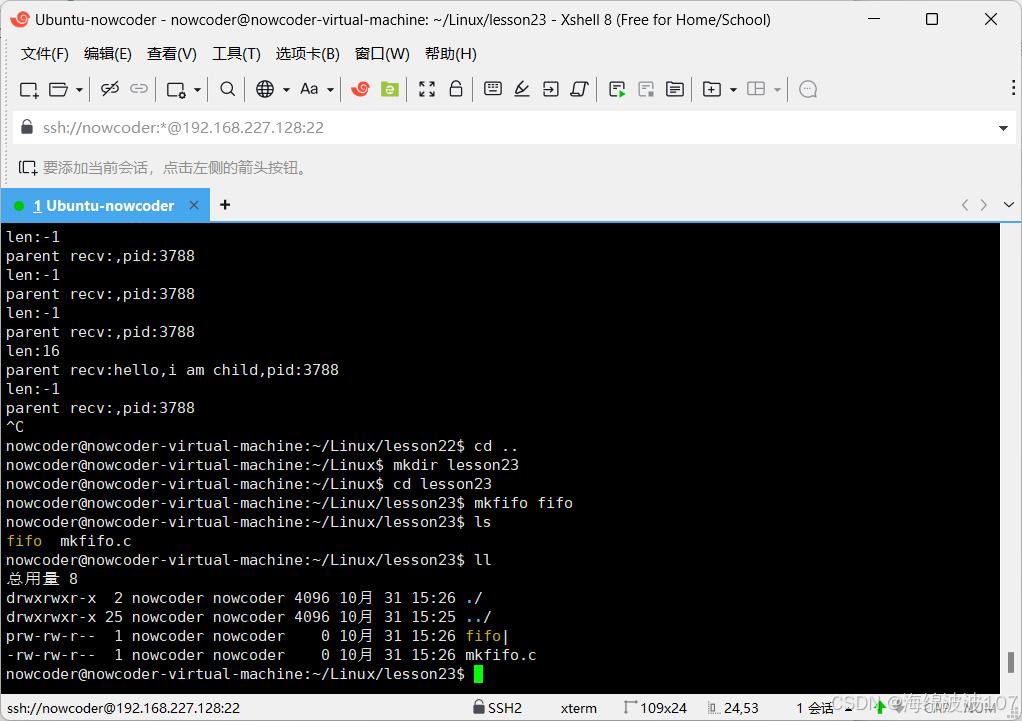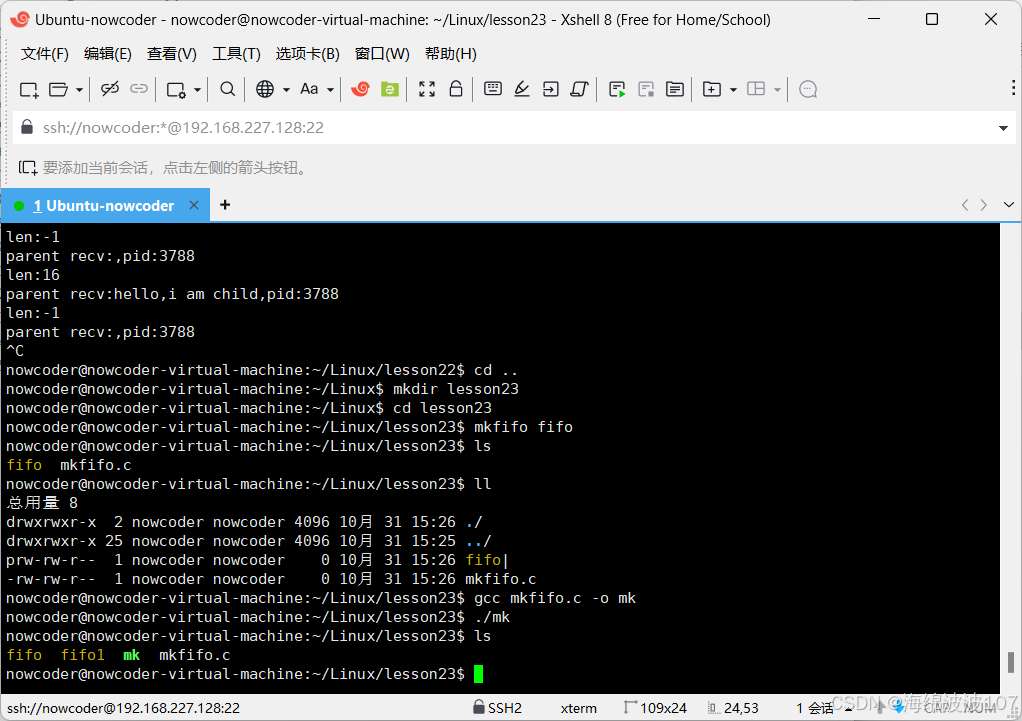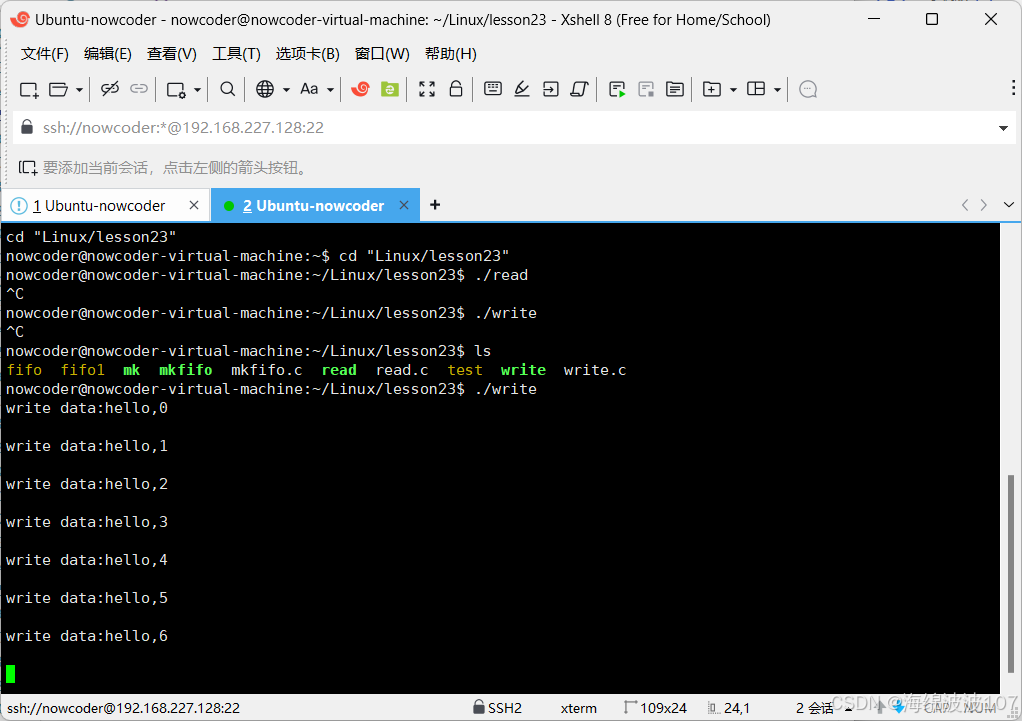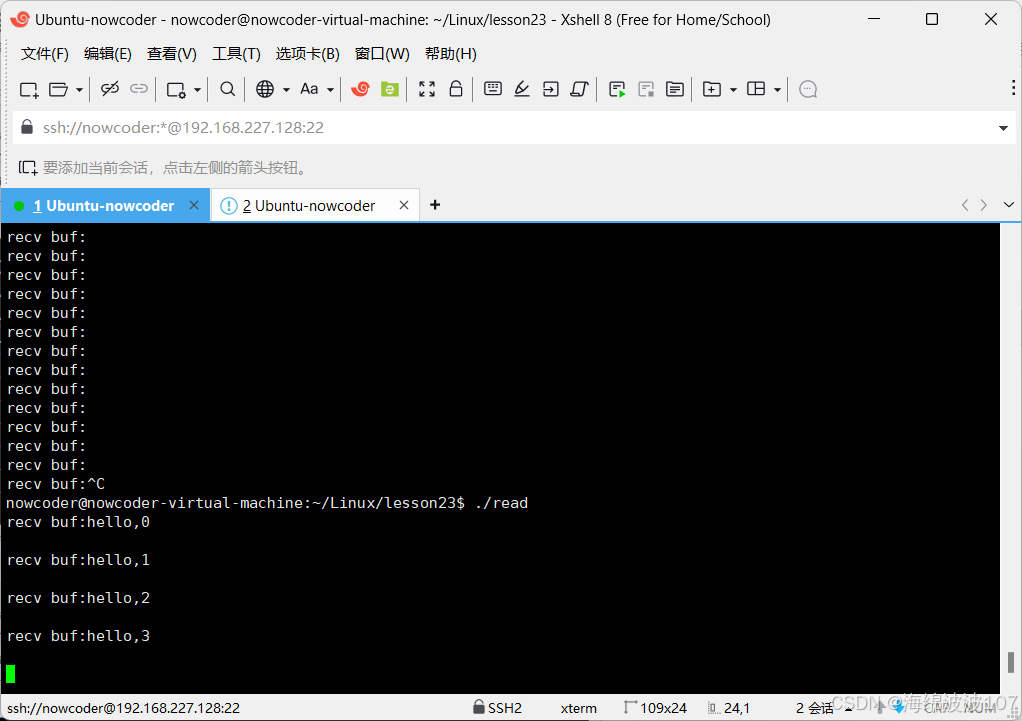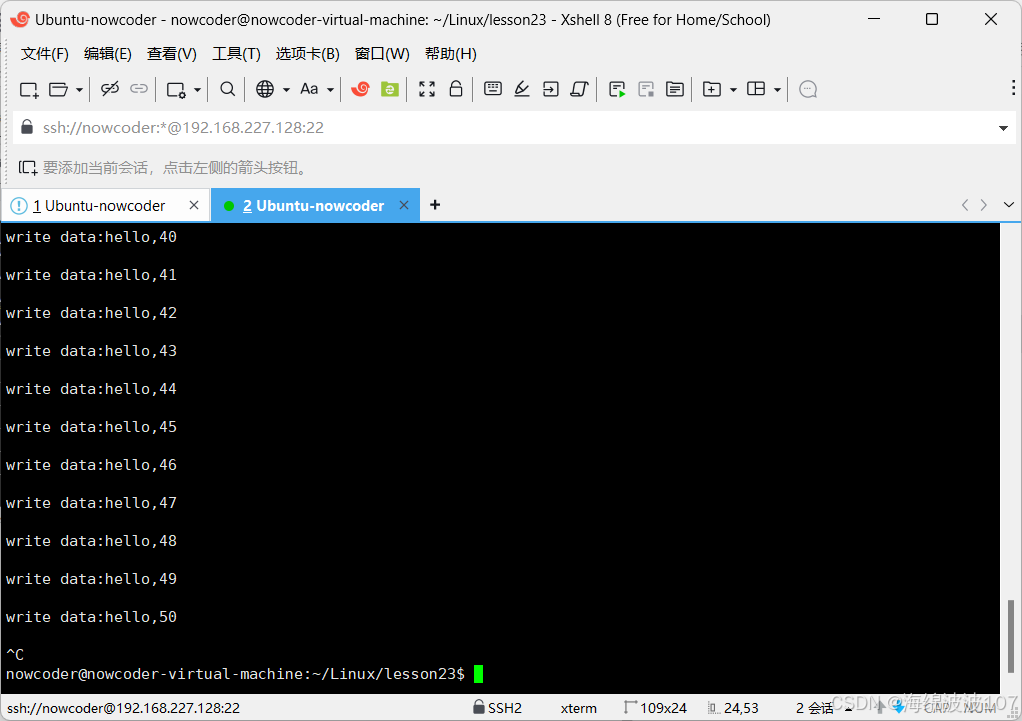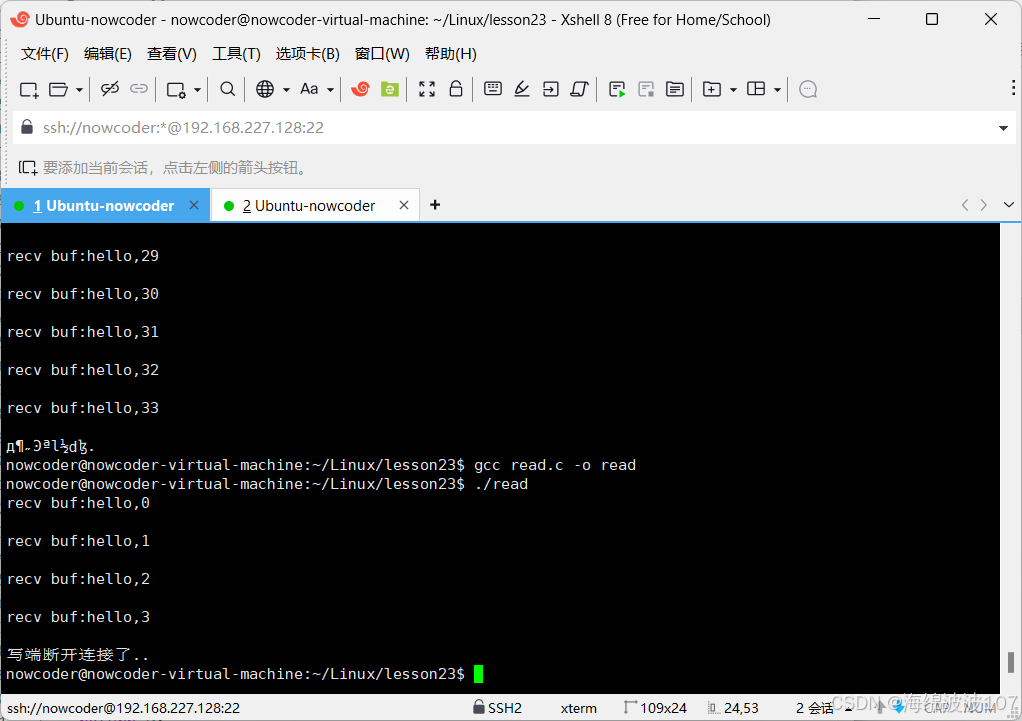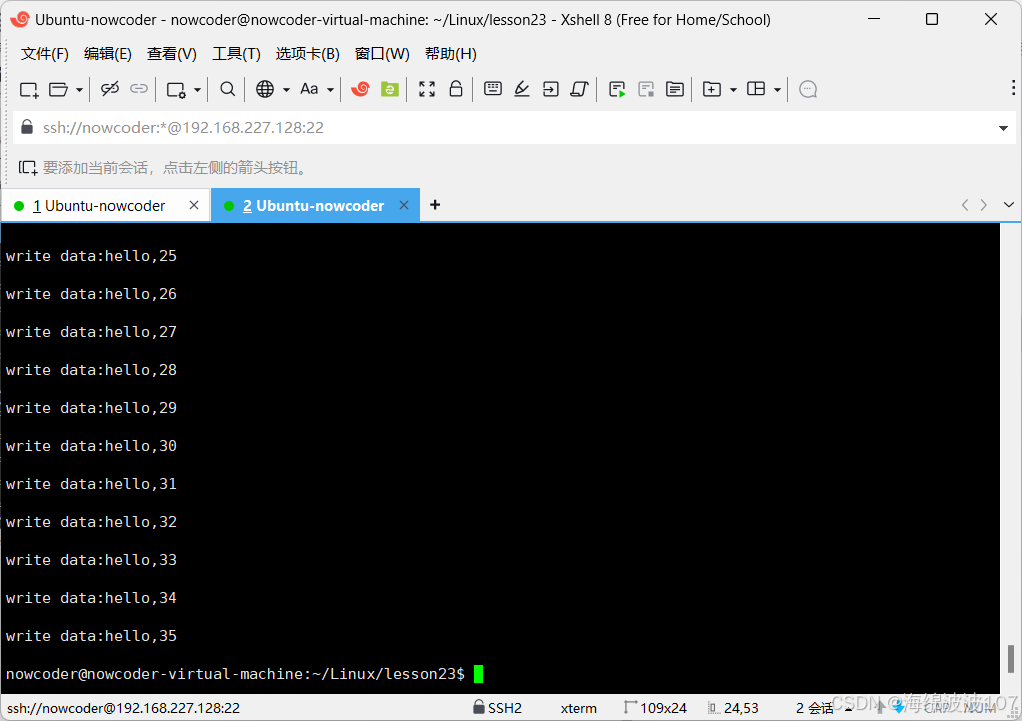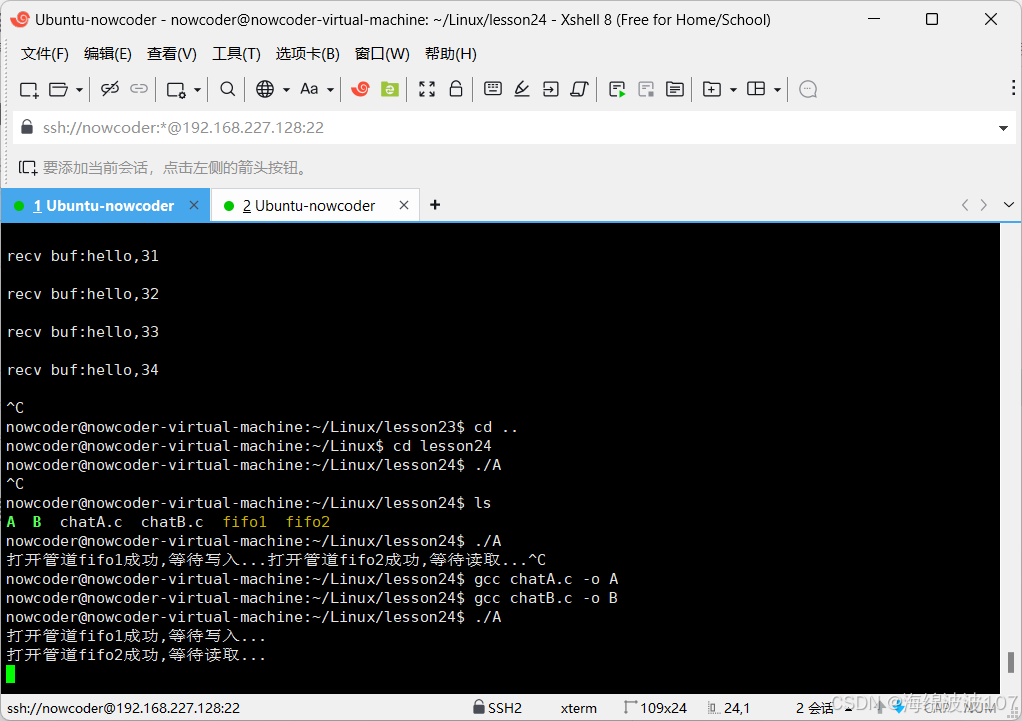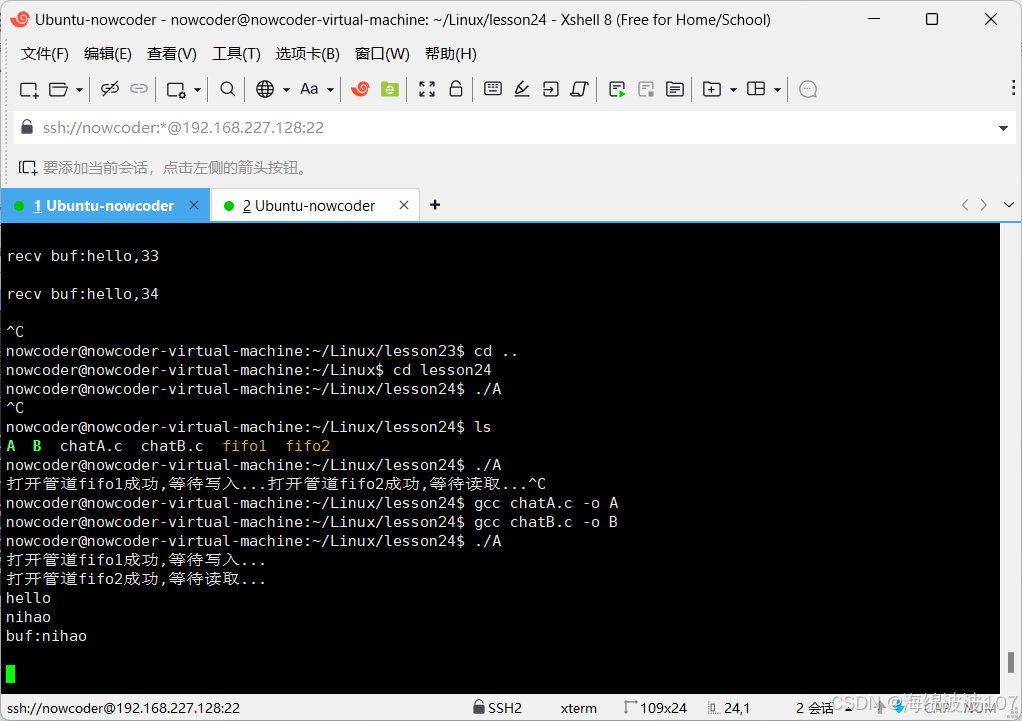有名管道
可以用在没有关系的进程之间,进行通信
有名管道使用
-
通过命令创建有名管道
mkfifo 名字
-
通过函数创建有名管道
int mkfifo
#include <stdio.h>
#include <sys/types.h>
#include <sys/stat.h>
#include <string.h>
#include <stdlib.h>
int main(){
int ret=mkfifo("fifo1",0664);
if(ret==-1){
perror("mkfifo");
exit(0);
}
return 0;
}
write.c
#include <stdio.h>
#include <sys/types.h>
#include <sys/stat.h>
#include <string.h>
#include <stdlib.h>
#include <unistd.h>
#include <fcntl.h>
//向管道中写数据
int main(){
//1.判断文件是否存在
int ret=access("test",F_OK);
if(ret==-1){
printf("管道不存在,创建管道\n");
//2.创建管道文件
ret=mkfifo("test",0664);
if(ret==-1){
perror("mkfifo");
exit(0);
}
}
//3.打开管道
int fd=open("test",O_WRONLY);
if(fd==-1){
perror("open");
exit(0);
}
//写数据
for(int i=0;i<100;i++){
char buf[1024];
sprintf(buf,"hello,%d\n",i);
printf("write data:%s\n",buf);
write(fd,buf,strlen(buf));
sleep(1);
}
close(fd);
return 0;
}
读端read.c
#include <stdio.h>
#include <sys/types.h>
#include <sys/stat.h>
#include <string.h>
#include <stdlib.h>
#include <unistd.h>
#include <fcntl.h>
//向管道中写数据
int main(){
//1.打开管道文件
int fd=open("test",O_RDONLY);
if(fd==-1){
perror("open");
exit(0);
}
//读数据
while(1){
char buf[1024]={0};
int len=read(fd,buf,sizeof(buf));
if(len==0){
printf("写端断开连接了..\n");
break;
}
printf("recv buf:%s\n",buf);
}
close(fd);
return 0;
}
读端和写端一起打开,才能写出数据
写端暂停之后,也读取不到了,就退出程序了
如果先关闭读端,写端也立马终止程序了
读端关闭了,还在写数据,会产生信号,因为没有读端了还写数据,管道会破裂,所以产生信号立马终止。
有名管道的注意事项
1.一个为只读而打开一个管道的进程会阻塞,直到另外一个进程为只写打开管道
2.一个为只写而打开一个管道的进程会阻塞,直到另一个进程为只读打开管道(与上一个相对)
读写特性
读管道:
管道中有数据,read返回实际读到的字节数
管道中无数据,管道写端被全部关闭,read返回0(相当于读到文件末尾)
写端没有全部被关闭,read阻塞等待
写管道:
管道读端被全部关闭,进程会异常终止,进程会收到sigpipe信号。
管道读端没有被全部关闭,管道已经满了,write会阻塞,管道未满,write将数据写入,并返回实际写入的字节数
有名管道实现简单版聊天功能
如何实现互发呢?
创建两个管道,一个从A到B,一个从B到A
chatA
#include <stdio.h>
#include <sys/types.h>
#include <sys/stat.h>
#include <string.h>
#include <stdlib.h>
#include <unistd.h>
#include <fcntl.h>
int main(){
//1.判断有名管道文件是否存在
int ret=access("fifo1",F_OK);
if(ret==-1){
//文件不存在
printf("管道不存在,创建对应的有名管道\n");
ret=mkfifo("fifo1",0664);
if(ret==-1){
perror("mkfifo");
exit(0);
}
}
ret=access("fifo2",F_OK);
if(ret==-1){
//文件不存在
printf("管道不存在,创建对应的有名管道\n");
ret=mkfifo("fifo2",0664);
if(ret==-1){
perror("mkfifo");
exit(0);
}
}
//2.以只写的方式打开管道fifo1
int fdw=open("fifo1",O_WRONLY);
if(fdw==-1){
perror("open");
exit(0);
}
printf("打开管道fifo1成功,等待写入...\n");
//3.以只读的方式打开管道fifo2
int fdr=open("fifo2",O_RDONLY);
if(fdr==-1){
perror("open");
exit(0);
}
printf("打开管道fifo2成功,等待读取...\n");
char buf[128];
//4.循环的写读数据
while(1){
memset(buf,0,128);
//获取标准输入的数据
fgets(buf,128,stdin);
//写数据
ret=write(fdw,buf,strlen(buf));
if(ret==-1){
perror("write");
exit(0);
}
//5.读管道数据
memset(buf,0,128);
ret=read(fdr,buf,128);
if(ret<=0){
perror("read");
break;
}
printf("buf:%s\n",buf);
}
//6.关闭文件描述符
close(fdr);
close(fdw);
return 0;
}
chatB
#include <stdio.h>
#include <sys/types.h>
#include <sys/stat.h>
#include <string.h>
#include <stdlib.h>
#include <unistd.h>
#include <fcntl.h>
int main(){
//1.判断有名管道文件是否存在
int ret=access("fifo1",F_OK);
if(ret==-1){
//文件不存在
printf("管道不存在,创建对应的有名管道\n");
ret=mkfifo("fifo1",0664);
if(ret==-1){
perror("mkfifo");
exit(0);
}
}
ret=access("fifo2",F_OK);
if(ret==-1){
//文件不存在
printf("管道不存在,创建对应的有名管道\n");
ret=mkfifo("fifo2",0664);
if(ret==-1){
perror("mkfifo");
exit(0);
}
}
//2.以只读的方式打开管道fifo1
int fdr=open("fifo1",O_RDONLY);
if(fdr==-1){
perror("open");
exit(0);
}
printf("打开管道fifo1成功,等待读取...\n");
//3.以只写的方式打开管道fifo2
int fdw=open("fifo2",O_WRONLY);
if(fdw==-1){
perror("open");
exit(0);
}
printf("打开管道fifo2成功,等待写入...\n");
char buf[128];
//4.循环的写读数据
while(1){
//5.读管道数据
memset(buf,0,128);
ret=read(fdr,buf,128);
if(ret<=0){
perror("read");
break;
}
printf("buf:%s\n",buf);
memset(buf,0,128);
//获取标准输入的数据
fgets(buf,128,stdin);
//写数据
ret=write(fdw,buf,strlen(buf));
if(ret==-1){
perror("write");
exit(0);
}
}
//6.关闭文件描述符
close(fdr);
close(fdw);
return 0;
}
拓展:如何解决聊天过程的阻塞
读和写不能放到同一个文件中,因为必然会引起阻塞,每次写完都需要等待对方上一次读完才能发过去
